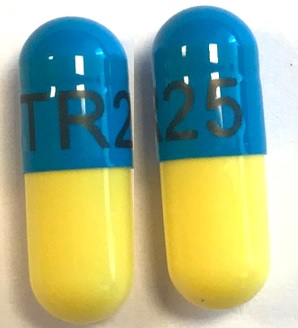Trimipramine Dosage
Medically reviewed by Drugs.com. Last updated on Jun 9, 2025.
Applies to the following strengths: 25 mg; 50 mg; 100 mg
Usual Adult Dose for:
Usual Geriatric Dose for:
Additional dosage information:
Usual Adult Dose for Depression
Outpatients/Office Patients:
- Initial dose: 75 mg orally per day in divided doses
- Maintenance dose: 50 to 150 mg orally per day
- Maximum dose: 200 mg/day
Hospitalized patients:
- Initial dose: 100 mg orally per day in divided doses
- Maintenance dose: 200 mg orally per day
- Maximum dose: 300 mg/day
Comments:
- The entire dose may be given at bedtime to improve patient compliance.
- The maintenance dose should be the lowest dose that will maintain remission.
- To minimize relapse, maintenance therapy should be continued for at least 3 months.
Use: Relief of symptoms of depression
Usual Geriatric Dose for Depression
Initial: 50 mg orally per day
Maintenance dose: 100 mg orally per day
Comments:
- Maintenance therapy is preferably administered as a single dose at bedtime.
- The maintenance dose should be the lowest dose that will maintain remission.
- To minimize relapse, maintenance therapy should be continued for at least 3 months.
Use: Relief of symptoms of depression
Renal Dose Adjustments
Data not available
Liver Dose Adjustments
Liver dysfunction: Use with caution
Dose Adjustments
Switching TO/FROM this drug FROM/TO a MAOI used to treat psychiatric disorders:
- Allow a medication-free interval of at least 14 days.
Use with other MAOIs (e.g., IV methylene blue, linezolid):
- Starting this drug: Use should be avoided; healthcare providers should consider other interventions (e.g., hospitalization) in patients who require urgent treatment.
- Patients already receiving this drug: If alternative treatments are not available AND the potential benefits of treatment outweigh the risks of serotonin syndrome, this drug should be promptly stopped and linezolid or IV methylene blue should be administered.
- Patients should be monitored for serotonin syndrome for 2 weeks OR until 24 hours after the last dose of the MAOI, whichever comes first.
- This drug may be resumed 24 hours after the last dose of the MAOI.
Evidence of pathological neutrophil depression:
- Discontinue treatment.
Precautions
US BOXED WARNINGS:
SUICIDALITY AND ANTIDEPRESSANT DRUGS:
- Antidepressants increased the risk compared to placebo of suicidal thinking and behavior (suicidality) in children, adolescents, and young adults in short-term studies of major depressive disorder (MDD) and other psychiatric disorders. Anyone considering the use of this drug or any other antidepressant in a child, adolescent, or young adult must balance this risk with the clinical need.
- Short-term studies did not show an increase in the risk of suicidality with antidepressants compared to placebo in adults beyond age 24. There was a reduction in risk with antidepressants compared to placebo in adults aged 65 and older.
- Depression and certain other psychiatric disorders are themselves associated with increases in the risk of suicide. Patients of all ages who are started on antidepressant therapy should be monitored appropriately and observed closely for clinical worsening, suicidality, or unusual changes in behavior. Families and caregivers should be advised of the need for close observation and communication with the prescriber.
- This drug is not approved for use in pediatric patients.
Safety and efficacy have not been established in patients younger than 18 years.
Consult WARNINGS section for additional precautions.
Dialysis
Data not available
Other Comments
Storage requirements:
- Protect from light.
General:
- The onset of effect for antidepressants is typically between 10 days and 4 weeks; increasing the dose during this time may increase the risk of adverse reactions without shortening the time to onset.
- Treatment may be more effective in patients with endogenous depression compared to patients with other depressive states.
- In clinical studies, this drug appeared to be equivalent to amitriptyline in the treatment of less-depressed patients, but may be somewhat less effective in treating more severely depressed patients.
- This drug was equally effective compared to imipramine in relieving depression in hospitalized depressed patients.
- The risk of serotonin syndrome with the use of non-IV methylene blue formulations or IV doses much lower than 1 mg/kg is unknown.
Monitoring:
- Cardiovascular: Blood pressure, cardiac function, especially in elderly patients
- Hematologic: Periodic blood cell counts, signs/symptoms of infection
- Hepatic: Liver function, especially in patients receiving long-term treatment
- Metabolic: Blood glucose levels
- Psychiatric: Patients should be monitored for worsening and emergence of suicidal thoughts.
Patient advice:
- Patients should be instructed to inform their other physician(s) that they are using this drug.
- Patients should tell their healthcare provider(s) about all the medicines that they take, including prescription and non-prescription medicines.
- This medicine may increase the risk of suicidal thoughts and behavior. Patients should be alert for the emergence or worsening of symptoms of depression, any unusual changes in mood or behavior, or the emergence of suicidal thoughts, behavior, or thoughts about self-harm. Patients should report any behavior of concern to their healthcare provider(s) as soon as possible.
- Patients should be advised to speak to a healthcare provider if they are pregnant, intend to become pregnant, or are breastfeeding.
- This medicine may cause impaired judgment, thinking, or motor skills; patients should avoid driving a car or operating dangerous machinery until the full effects of this drug are seen.
More about trimipramine
- Check interactions
- Compare alternatives
- Pricing & coupons
- Reviews (2)
- Drug images
- Side effects
- During pregnancy
- Drug class: tricyclic antidepressants
- Breastfeeding
- En español
Patient resources
Other brands
Professional resources
Other brands
Related treatment guides
See also:
Further information
Always consult your healthcare provider to ensure the information displayed on this page applies to your personal circumstances.


